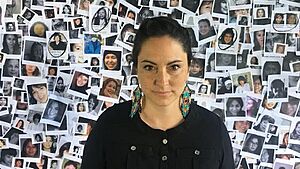Kim O'Bomsawin facts for kids
Kim O’Bomsawin is a talented writer, film director, and a champion for human rights. She works especially to support Indigenous women in Canada and the U.S. Kim O'Bomsawin is from the Abenaki people, who are a First Nation group in Quebec, Canada. Many people see her as a very important Indigenous filmmaker today.
Contents
Kim O'Bomsawin's Life Story
Kim O'Bomsawin studied sociology and earned a master's degree. Sociology is the study of how people live together in groups and societies. After her studies, she decided to make documentary films. These are movies that tell true stories about real people and events.
She has helped write a TV series called Skindigenous. Kim O'Bomsawin has also written and directed several films. These include La ligne rouge (2014), Kirano (2015), Quiet Killing (2017), Du Teweikan à l’électro (2017), and Call Me Human (2020).
Exploring Kim O'Bomsawin's Films
Kim O'Bomsawin has created many powerful films. Each one shares important stories and ideas.
Skindigenous Docu-Series
The TV series Skindigenous first aired in Canada in 2018. This series explores how tattoos are a very old art form. It shows that tattoos are not just for one place or one group of people. The filmmakers travel around the world. They learn how ancient tribal traditions are still part of tattoo culture today. Each episode focuses on a different part of the world and the people who practice this special art.
The Red Line Film
The Red Line was Kim O'Bomsawin's first film. This documentary looks at hockey in Indigenous communities in Quebec. It focuses on young players like Amy-Léa, Mikisew, and Frédérik. Like many young Canadians, they give their all to hockey. The film's title, "The Red Line," refers to the difficult choices these players face. They must choose between their cultural practices and their love for the sport. The film also shows how sports can help young people stay out of trouble in some First Nation communities.
Kirano Web Documentary
Kirano is a documentary made for the internet. It tells the stories of 10 important Indigenous people. These include rapper Samian and snowboard athlete Caroline Calvé. All 10 people are asked to answer one question: "How do you define yourself as Indigenous in 2015?" Kim O'Bomsawin cleverly divided this film into 10 short video clips. You can watch them online.
Quiet Killing Documentary
Quiet Killing is one of Kim O'Bomsawin's most well-known films. It shares the true stories of many missing and murdered Indigenous women in Canada. Through this film, O'Bomsawin helps people understand this serious social issue. She shows the human side of a problem that often goes unnoticed.
From Teweikan to Electro Project
More recently, Kim O'Bomsawin created a project called From Teweikan to Electro. This project celebrates how music and sound can bring people together. In this film, she features singers and songwriters like Pakesso Mukash, Shauit, and Moe Clark. These artists are making their mark in electronic and reggae music. They work to connect different generations, the living with those who have passed, and different lands. O'Bomsawin made this project to trace the history of First Nation music.
Telling Our Story Series
In 2023, she created a documentary series called Telling Our Story. This series continues her work of sharing important narratives.
Ninan Auassat: We, the Children Film
Her documentary film Ninan Auassat: We, the Children was shown for the first time at the 2024 Vancouver International Film Festival. It won an award for Best Canadian Documentary there.
Kim O'Bomsawin's Activism
Besides making films that highlight the voices of First Nation people, Kim O'Bomsawin also works as an activist. She wants to make sure Indigenous people are shown and respected in the world of art.
She spoke out about the importance of representation when she criticized a play called Kanata. This play aimed to tell the history of the relationship between white and Indigenous people in Canada. However, it was canceled in July 2017. This happened after more than 30 members of the Canadian Indigenous community, including Kim O'Bomsawin, wrote an open letter. They said the play was wrong for not including Indigenous performers.
In an interview, she explained her thoughts. She said, "I thought, 'Maybe with my experience, I can help (the playwright) understand. I want him to see what this means for people – the pain it causes.' Is it really necessary (to leave out Indigenous actors), just for art? You might have the right, but is it truly needed?"
Kim O'Bomsawin also commented on a past event involving Canadian Prime Minister Justin Trudeau. She said it was surprising to see the Canadian leader in blackface.
 | John T. Biggers |
 | Thomas Blackshear |
 | Mark Bradford |
 | Beverly Buchanan |


